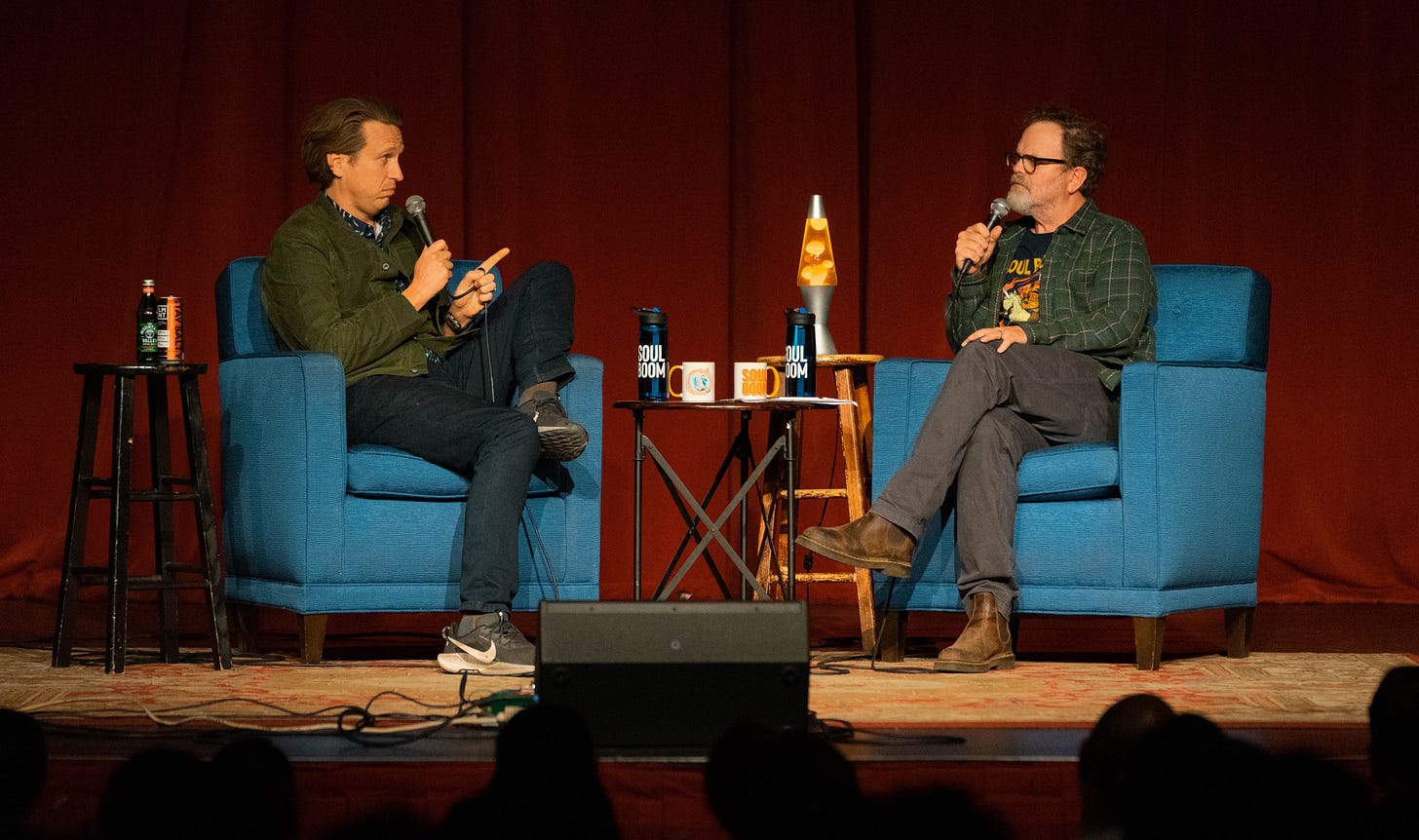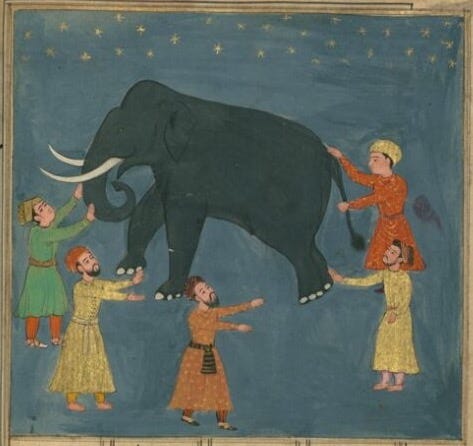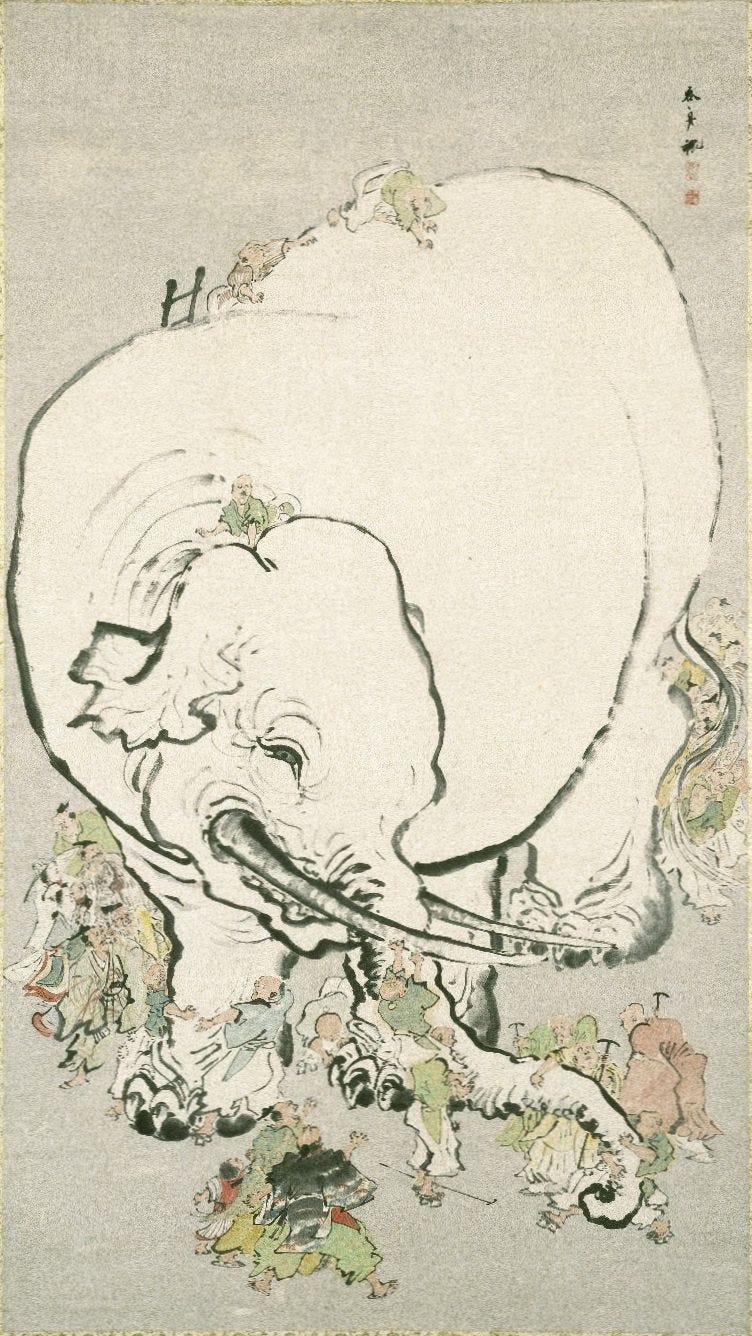God Is the Punchline? A Soul Boom Take
PLUS: Soul Boom Live! Pete Holmes & Creed Bratton joined Rainn on stage at Largo for a night of music, meaning, and idiocy—exactly how we like it.
Hey Beautiful Weirdos,
This week on the Soul Boom podcast, we’re bringing you something a little different: our very first Soul Boom Live!
If you were able to join us in person, you probably remember it well — an evening under the warm glow of stage lights at Largo, an audience buzzing with anticipation, and Creed Bratton — yes, that Creed from The Office — taking the stage with his guitar, serenading us with songs and tales of rock-and-roll chaos, hope, and cosmic weirdness. Because, let’s face it, Creed exists in a reality slightly adjacent to ours, and we’re all better for it.

Then, to headline our inaugural Soul Boom Live, came comedian, podcaster, and deep spiritual thinker (it turns out) Pete Holmes. What unfolded was very funny — but it was more than comedy. It was a theological jam session disguised as stand-up. A cosmic comedy hour with two seekers unafraid to wrestle with life’s biggest questions—and to laugh about them in the process.

Pete, of course, is hilarious. But beneath the RoboCop riffs and goofy impressions is a mind endlessly hungry for truth. He grew up evangelical, the kind of youth group kid who didn’t smoke, didn’t drink, didn’t have sex before marriage. But as Pete came to see, his motives weren’t so pure after all. By his telling, he realized his faith was transactional. God was like a mafia boss: you pay your dues in devotion and good behavior, and He protects you. But when Pete’s first wife left him for another man, his sense of spiritual security collapsed. The God he thought would shield him didn’t. Everything he believed in cracked open.
Over time, Pete realized the version of Christianity he’d been handed no longer felt true. His faith journey shifted from literalism to metaphor, from rule-following to exploring consciousness itself. What he didn’t do was reject spirituality altogether. For him, myths aren’t lies; they’re truths so deep they can only be told symbolically.
He found an approach to these verities in teachers like Richard Rohr, Joseph Campbell, Eckhart Tolle, and Rob Bell. And these days, Pete’s been especially drawn to Rupert Spira. If you’ve heard Pete’s bit about God being no-thing and loved it — well that’s definitely some Rupert Spira inspiration (by the way, Pete does a hilarious version of that bit in this episode!).
So who is Rupert Spira? He’s one of today’s leading teachers of Advaita Vedanta, the non-dual tradition of Hindu philosophy. That sounds academic, but Spira’s style is calm, practical, and accessible. His teachings build on an ancient lineage that’s been asking the same question for thousands of years:
Who are we, really?
To understand Advaita Vedanta, it’s helpful to understand the concept of Dualism—which says reality is split: God “out there,” creation “down here,” us as separate creatures fumbling around.
Nondualism, on the other hand, says there is only one ultimate reality. Self vs. other, God vs. world—these divisions are illusions. Advaita Vedanta literally means “not two.” Its ancient texts teach that the individual self (Atman) is not separate from the ultimate reality (Brahman). We are it, wearing human costumes.
Rupert Spira uses the metaphor of a movie screen. Life is the movie—joy, pain, love, loss—but behind it all is the screen of awareness. The movie can’t stain or burn the screen. Likewise, our true nature remains untouched, no matter what happens.
For Spira, this isn’t just philosophical speculation. It’s a direct experience available to anyone willing to look deeply. When we realize we are Awareness Itself — spacious, free, unbounded — life’s storms lose their power to sink us. We remain, like the sky itself, open and vast.
We see why Rupert resonates with Pete. Pete often says enlightenment isn’t something you gain. You can’t become what you already are. That’s the cosmic joke — and the deepest truth.
Rupert Spira and Advaita Vedanta teach that all distinctions are ultimately illusions of Maya. Only Brahman — pure, unchanging consciousness — is real. Creation is like a dream: beautiful, fleeting, but lacking ultimate reality in itself.
Rainn loves Rupert too (Pete turned him onto Rupert that night at Largo). As a Bahá’í, Rainn finds resonance in Spira’s ideas — the Bahá’í writings also teach that we humans aren’t just anxious meat-suits worrying about taxes, texts, and traffic. And the Bahá’í teachings likewise affirm the ephemeral nature of this world. Bahá’u’lláh writes that the goal of a true seeker is to:
“... regard all else beside God as transient, and count all things save Him, Who is the Object of all adoration, as utter nothingness.”
He calls this world a show—a shadow compared to the true reality beyond our senses.
But here’s the twist: while the Bahá’í writings agree this world is fleeting and lacks independent reality, they also insist it’s purposeful and sacred. It’s a divinely orchestrated training ground. A place where souls are polished, hearts are refined, and every test is an invitation to reflect a little more of the divine.
In other words, life is about growing into awareness of our eternal relationship with the Source of all being. It’s a journey without end. A mystical path where we awaken to the divine image within us, reflect it outward as love, justice, and mercy, and keep drawing closer to God forever. We’re not here to ditch this world like a prison escapee ditching their getaway car. We’re here to transform it—and ourselves — into something more radiant than we ever imagined.

So… how do we know who’s right?
Should Pete and Rainn duke it out in a metaphysical cage match, smacking each other with quotes from their respective spiritual teachings until only one worldview remains standing?
Well… obviously not. But it won’t surprise you that the Soul Boom answer isn’t to ignore those differences either. Our take? We should welcome the chance to explore different traditions and paths and see what we can learn from each other. No single person can have a full or complete understanding of reality. We can always learn from one another.
The parable of the blind men and the elephant comes to mind. It’s one of humanity’s oldest spiritual teaching stories, and it shows up in cultures and religions across the world.
Its earliest recorded version comes from ancient India, where it was told in Hindu, Buddhist, and Jain traditions. In these tellings, a group of blind men encounter an elephant for the first time.

In Rumi’s version from The Masnavi, an elephant is brought to a dark room. Curious townspeople enter to investigate. One touches the trunk and declares, “It’s like a thick snake.” Another feels the ear and says, “No, it’s a fan.” Another grabs a leg: “It’s a pillar.” Someone else touches the back: “It’s a throne.” Another grabs the tail: “It’s a rope.”
They argue, each insisting their perception is truth. But as Rumi writes:
The eye of sense perception is like the palm of a hand —
it can feel only the touch, and no more.
Then with the poem’s coda, Rumi takes it one step further — conveying an ineffable truth through metaphor:
The sea is one thing, the foam another.
Leave the foam and look with the eye of the sea.
The palm cannot grasp the whole of it —
to grasp the ocean,
look with the eye of the ocean.
Here Rumi’s telling us that some truths are beyond our minds. But if we see with the eye of the heart — the place many religions say God resides — we can understand things on a whole other level.
Speaking of seeing with the eye of the heart, as you watch the episode, it’s clear that Rainn and Pete are walking spiritual paths that aren’t exactly identical. But it’s just as clear they’re both moving in the same general direction: becoming more realized versions of themselves and helping create a more realized world.
Reality is vast. God is vast beyond comprehension. We are each reaching out, fumbling in the dark, touching mystery and translating it through our experiences, cultures, scriptures, and teachers.

This is where convergence and divergence meet. And when it comes to spirituality, maybe there are a few things we can actually agree on: It reminds us we’re more than we appear. That ego gets in the way. That we’re more than the shallow labels and identities society sticks on us. And true spirituality doesn’t just transform the self. It transforms society. Because honestly — what good is enlightenment if it doesn’t make the world better?
And by the way, a spiritual life doesn’t have to turn us into sourpusses. You could even say God loves laughter—it’s another way to experience the Divine. Comedy, Pete says, is service. Making people laugh isn’t just ego-gratification; it’s dissolving fear, opening hearts, loosening the grip of self-seriousness. That’s moral work. That’s spiritual work. As he says in the episode, “Comedy is my religion.” Rainn agreed, adding that in a world obsessed with money, power, and status, the jester is often the only truth-teller left.
Here on this beautiful home we call Earth, no one gets the final say on what Ultimate Reality really is. We’re all just along for the ride. This metaphysical pachyderm we’re journeying on is infinite and eternal — a loving, playful mystery taking us to a destination we can scarcely imagine.




Reading this: real SOUL BOOM. God, baby, and bathwater are all thrown out these days. It’s hard to find people who are defrosted enough to notice how frozen we are in our lives of repetition. A real meeting of people? Discussion of nondualism, comedy as moral work? Sign up this fellow Gordon alum and seeker: this lands and lifts the heart.
What a great recap and beautiful message. That night was a lot of fun. Thanks!